andrew jackson
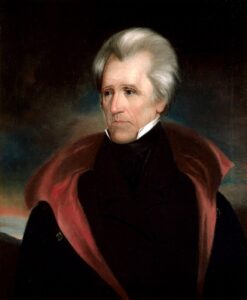 I’m not sure why it is that every president “needs” a pet. Nevertheless, it seems that it is expected, and the “first dog” seems to be the most common choice of pet. Dogs are the most commonly talked about pets in the White House…in recent years anyway. The fact is that ever since George Washington, there has been a myriad of different animals that earned the title of presidential pet or first pet. Some of the more manageable animals to come under the care of the president were cats, horses, donkeys, cows, goats, and hamsters. Oddly, there were also the more “unique” animals that lived in the White House too, including, and often only temporarily, bobcats, raccoons, lions, tigers, and bears, if you can believe it.
I’m not sure why it is that every president “needs” a pet. Nevertheless, it seems that it is expected, and the “first dog” seems to be the most common choice of pet. Dogs are the most commonly talked about pets in the White House…in recent years anyway. The fact is that ever since George Washington, there has been a myriad of different animals that earned the title of presidential pet or first pet. Some of the more manageable animals to come under the care of the president were cats, horses, donkeys, cows, goats, and hamsters. Oddly, there were also the more “unique” animals that lived in the White House too, including, and often only temporarily, bobcats, raccoons, lions, tigers, and bears, if you can believe it.
One of the more common kind of animals was the variety of birds that have worn the title pf presidential pet. Birds, such as turkeys, mockingbirds, parakeets, and several other species of parrot and songbird have been the companions of past presidents and their families. One of the presidents that had a bird was Andrew Jackson, the seventh president, who owned a variety of pets, among them, an African grey parrot named Poll that he had purchased for his wife, Rachel. Unfortunately, had very little influence on Poll, because she died of a heart attack not long after his election in 1828. Because of Rachel’s untimely death, and unlike other presidential parrots, Poll took on some of Jackson’s more unbecoming characteristics. To put it mildly, Andrew Jackson was 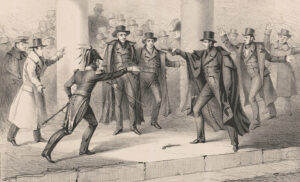 an exceptionally volatile individual who often disregarded formality. On the one hand, Jackson’s character helped him to actually survive an assassination attempt and to win the Battle of New Orleans. Both of these made him quite popular, even though the treaty that followed the battle, was almost pointless, and so the battle was viewed much the same. On the other hand, as both a general and later president, Jackson used every tool at his disposal to crush indigenous sovereignty. He really had no use for the Native Americans, or at least not for their rights as a sovereign nation. In fact, his actions both directly and indirectly caused the deaths of thousands of Native Americans.
an exceptionally volatile individual who often disregarded formality. On the one hand, Jackson’s character helped him to actually survive an assassination attempt and to win the Battle of New Orleans. Both of these made him quite popular, even though the treaty that followed the battle, was almost pointless, and so the battle was viewed much the same. On the other hand, as both a general and later president, Jackson used every tool at his disposal to crush indigenous sovereignty. He really had no use for the Native Americans, or at least not for their rights as a sovereign nation. In fact, his actions both directly and indirectly caused the deaths of thousands of Native Americans.
Nevertheless, where Poll was concerned, the loss of Rachel and Jacksons crude talk led to a number of problems later on. Poll was therefore almost constantly exposed to the already foul-mouthed and hot-tempered president. I don’t suppose all that matter very much to Jackson, who was obviously used to his own way of speaking, but on the day of Jackson’s funeral, it was decided by Jackson, that Poll was to be in attendance, 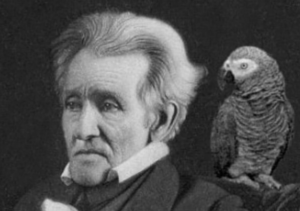 along with the grieving spectators. I can only imagine the guests, especially of that era, Jackson passed away on June 8, 1845, when after possibly being unnerved by the number of people, Poll proceeded to shock all of the guests when he began to exclaim all sorts of profanity and otherwise inappropriate language. According to witnesses, Poll’s outbursts were so disruptive that the bird had to be escorted away from the proceedings. Even after his departure, I’m sure that the prim and proper ladies and gentlemen had to take a moment to compose themselves before the funeral could continue. I guess it just goes to show that sometimes, more than just our children are listening to every word we say.
along with the grieving spectators. I can only imagine the guests, especially of that era, Jackson passed away on June 8, 1845, when after possibly being unnerved by the number of people, Poll proceeded to shock all of the guests when he began to exclaim all sorts of profanity and otherwise inappropriate language. According to witnesses, Poll’s outbursts were so disruptive that the bird had to be escorted away from the proceedings. Even after his departure, I’m sure that the prim and proper ladies and gentlemen had to take a moment to compose themselves before the funeral could continue. I guess it just goes to show that sometimes, more than just our children are listening to every word we say.
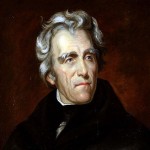
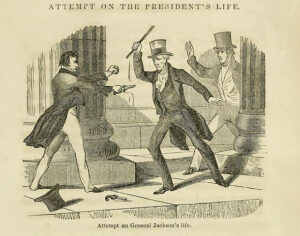 Over the course of American history, several presidents have been assassinated, and several others have survived attempted assassinations. Some were quickly treated, and others were not where the would-be assassin thought they were going to be. Still, Andrew Jackson, the seventh US president better known as “Old Hickory” was, without doubt, the most amazing one. and for good reason, as one would-be assassin found out.
Over the course of American history, several presidents have been assassinated, and several others have survived attempted assassinations. Some were quickly treated, and others were not where the would-be assassin thought they were going to be. Still, Andrew Jackson, the seventh US president better known as “Old Hickory” was, without doubt, the most amazing one. and for good reason, as one would-be assassin found out.
On January 30, 1835, Richard Lawrence came up to the 67-year-old Jackson, as he left a congressional funeral and pulled a pistol on him. I’m sure he thought a 67-year-old man was going to be an easy target, but when he pulled the trigger, the gun misfired. While having his gun misfire was…inconvenient, Lawrence also found out that a 67-year-old man is not necessarily a weak, old man. A furious Jackson began beating the man viciously with his cane in retaliation. Then, while trying to dodge the cane wielded by Jackson, Lawrence managed to pull a second gun from his jacket and pull the trigger. I don’t know how, but Lawrence had to be either the unluckiest assassin, or a totally inept gunman, because the second gun also jammed. By this point, Jackson’s aides were able to wrestle Lawrence away and into custody. Jackson was unharmed. 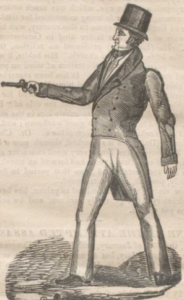
Jackson became convinced that the attempt was made at the behest of his political enemies, even though all evidence pointed to Lawrence being a mentally unstable lone wolf. I rather think I might agree with Jackson on this one, because politics can be a deadly career to get into. Jackson spent the rest of his presidency worried about another attack, while his vice president, Martin Van Buren, started carrying two loaded pistols with him into the Senate.
You can take away any opinion on this matter that you want to, but I have my own. I find it amazing that Jackon had the wherewithal to “pull” his cane on his would-be assassin, but how often to you see two different guns misfire in the commission of the same assassination. I see that situation as nothing but God. Jackson was the recipient of a double miracle. If either of those gun shots would have connected to their mark, he would surely have been dead. This was not a sniper shooter, but rather, a close-range shooter, and would have meant instant death. No, this man was divinely protected, and that’s all there is to it.
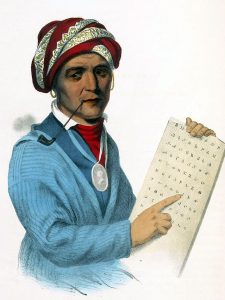 The Indian tribes in the United States had a spoken language, but in the early years they had no real need for a written language, other than hieroglyphics. At some point, a young Cherokee man named Sequoyah noticed something about the men in Andrew Jackson’s platoon, while he and some other Cherokee men were volunteering in the fight against the British in the War of 1812. In dealing with the Anglo soldiers and settlers, Sequoyah became intrigued by their “talking leaves” or printed books. Sequoyah realized that somehow the “talking leaves” recorded human speech. In a brilliant leap of logic, Sequoyah comprehended the basic nature of symbolic representation of sounds and in 1809 he began working on a similar system for the Cherokee language. Little did Sequoyah know that his work would change things, and in fact, change life for the Cherokee people. Still, it was not without it’s downside. Sequoyah was ridiculed and misunderstood by most of the Cherokee. Nevertheless, he made slow progress until he came up with the idea of representing each syllable in the language with a separate written character. Finally, he perfected his syllabary of 86 characters, a system that could be mastered in less than week. After obtaining the official endorsement of the Cherokee leadership, Sequoyah’s invention was soon adopted throughout the Cherokee nation.
The Indian tribes in the United States had a spoken language, but in the early years they had no real need for a written language, other than hieroglyphics. At some point, a young Cherokee man named Sequoyah noticed something about the men in Andrew Jackson’s platoon, while he and some other Cherokee men were volunteering in the fight against the British in the War of 1812. In dealing with the Anglo soldiers and settlers, Sequoyah became intrigued by their “talking leaves” or printed books. Sequoyah realized that somehow the “talking leaves” recorded human speech. In a brilliant leap of logic, Sequoyah comprehended the basic nature of symbolic representation of sounds and in 1809 he began working on a similar system for the Cherokee language. Little did Sequoyah know that his work would change things, and in fact, change life for the Cherokee people. Still, it was not without it’s downside. Sequoyah was ridiculed and misunderstood by most of the Cherokee. Nevertheless, he made slow progress until he came up with the idea of representing each syllable in the language with a separate written character. Finally, he perfected his syllabary of 86 characters, a system that could be mastered in less than week. After obtaining the official endorsement of the Cherokee leadership, Sequoyah’s invention was soon adopted throughout the Cherokee nation.
Finally, it was time for the next step. The General Council of the Cherokee Nation decided to purchase a 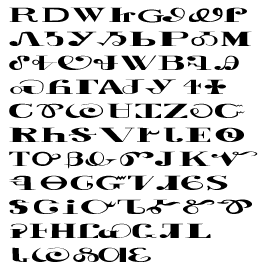 printing press. Their goal was to produce a newspaper in the Cherokee language. When the Cherokee-language printing press arrived on this day, February 21, 1828, the lead type was based on Sequoyah’s syllabary. Within months, the first Indian language newspaper in history appeared in New Echota, Georgia. It was called the Cherokee Phoenix. The Cherokee tribe was one of what the Americans called the “five civilized tribes” and they were native to the American Southeast. The Cherokee had long ago decided to embrace the United States’ program of “civilizing” Indians in the years after the Revolutionary War. In the minds of Americans, Sequoyah’s syllabary showed the Cherokee desire to fit into their dominant Anglo world. The Cherokee used their new press to print a bilingual version of the republican constitution. They also took many other steps to assimilate Anglo culture and practice while still preserving some aspects of their traditional language and beliefs. The press worked well, but would have been useless had it not been for the extraordinary work of Sequoyah.
printing press. Their goal was to produce a newspaper in the Cherokee language. When the Cherokee-language printing press arrived on this day, February 21, 1828, the lead type was based on Sequoyah’s syllabary. Within months, the first Indian language newspaper in history appeared in New Echota, Georgia. It was called the Cherokee Phoenix. The Cherokee tribe was one of what the Americans called the “five civilized tribes” and they were native to the American Southeast. The Cherokee had long ago decided to embrace the United States’ program of “civilizing” Indians in the years after the Revolutionary War. In the minds of Americans, Sequoyah’s syllabary showed the Cherokee desire to fit into their dominant Anglo world. The Cherokee used their new press to print a bilingual version of the republican constitution. They also took many other steps to assimilate Anglo culture and practice while still preserving some aspects of their traditional language and beliefs. The press worked well, but would have been useless had it not been for the extraordinary work of Sequoyah.
Sequoyah was born about 1770 in Tuskegee, Cherokee Nation, near present day Knoxville, Tennessee. He died 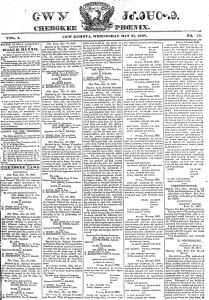 August 1843 at about 72 or 73, in San Fernando, Tamaulipas, Mexico. His name in English is George Gist or George Guess, which I find to be…well, crazy. Why was it necessary to butcher his name. Sequoyah was a Cherokee silversmith by trade, but his biggest claim to fame was the creation of written Cherokee. In 1821, when he completed his independent creation of a Cherokee syllabary, he successfully made reading and writing in Cherokee possible. This was one of the very few times in recorded history that a member of a pre-literate people created an original, effective writing system. After seeing its worth, the people of the Cherokee Nation rapidly began to use his syllabary and officially adopted it in 1825. Their literacy rate quickly surpassed that of surrounding European-American settlers. In recognition of his service, the Cherokee Nation voted Sequoyah an annual allowance in 1841. He died two years later on a trip to San Fernando, seeking Cherokee to return to Oklahoma with him. The giant California redwood tree, Sequoia, was named after him.
August 1843 at about 72 or 73, in San Fernando, Tamaulipas, Mexico. His name in English is George Gist or George Guess, which I find to be…well, crazy. Why was it necessary to butcher his name. Sequoyah was a Cherokee silversmith by trade, but his biggest claim to fame was the creation of written Cherokee. In 1821, when he completed his independent creation of a Cherokee syllabary, he successfully made reading and writing in Cherokee possible. This was one of the very few times in recorded history that a member of a pre-literate people created an original, effective writing system. After seeing its worth, the people of the Cherokee Nation rapidly began to use his syllabary and officially adopted it in 1825. Their literacy rate quickly surpassed that of surrounding European-American settlers. In recognition of his service, the Cherokee Nation voted Sequoyah an annual allowance in 1841. He died two years later on a trip to San Fernando, seeking Cherokee to return to Oklahoma with him. The giant California redwood tree, Sequoia, was named after him.
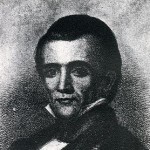
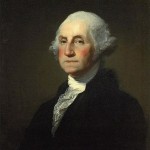 I have always known of my family’s relationship to Princess Diana, and I also knew about the Knox family’s relationship to James Knox Polk, who is Bob’s 2nd cousin 5 times removed, but in more recent years I have come across, or as one family member put it, tripped over a line of presidents on my side of the family as well as Bob’s. It seems that both of us are related George HW Bush, my 15th cousin once removed, and George W Bush, who is my 15th cousin 2 times removed. We are also related to, although in a roundabout way, Andrew Jackson, the husband of aunt of wife of 1st cousin 6x removed of my husband, Bob…I know, that one is a little bit complicated.
I have always known of my family’s relationship to Princess Diana, and I also knew about the Knox family’s relationship to James Knox Polk, who is Bob’s 2nd cousin 5 times removed, but in more recent years I have come across, or as one family member put it, tripped over a line of presidents on my side of the family as well as Bob’s. It seems that both of us are related George HW Bush, my 15th cousin once removed, and George W Bush, who is my 15th cousin 2 times removed. We are also related to, although in a roundabout way, Andrew Jackson, the husband of aunt of wife of 1st cousin 6x removed of my husband, Bob…I know, that one is a little bit complicated.
I did not know of the Spencer connection to, Calvin Coolidge, Franklin Delano Roosevelt, and George Washington. I also did not know of the Knox connection to the family history to Kentucky Frontiersman Daniel Boone, Benjamin Harrison, a signer of the Declaration of Independence; his son, William Henry Harrison, 9th President of the United States; his great-grandson, Benjamin Harrison, 23rd President of the United States and…President George Washington. At this point, I don’t know at what level we are related to these, but I am finding out that Bob’s family history and my family history are intermingled in several areas. Now that I have some of this information, I look forward to putting these people into my family history, so I can find out how we are connected and who else might be in the family.
I have also found out that on the Spencer side of the family, Henry and Isabella Lincoln Spencer, who lived in the 1400’s, had a very large influence on the United States, as well as England, through their offspring. And, I have found out that John and Jean Gracy Knox, who lived in the 1700’s, also had a large influence in American history through their offspring. It is very strange to me to look at the people in history, knowing that at the time they had children, they had no idea what impact those children and their descendants would have on the world. To be an American president or a signer of the Declaration of Independence, made these men very well known throughout history. Even a frontiersman from Kentucky who probably never gave any thought to what the future of our nation might be at the time he was doing his part to go down in history, has managed to become an endeared character in all the history books, as well as, in television shows and movies. Who would have ever thought that could happen?
It’s odd to think that, depending on what we do with our lives, any one of us could stand out in the history of the nation and the world. Little did anyone think of the future when they began whatever cause they held close to their heart, and yet, just a short time down the road, they have become a household name, written in every history book, with parks, schools, museums, and airports, named after them. I wonder if they had any inkling just how big they were going to become. It is mind boggling just to think back on it now, and I’m not them. Of course, they didn’t really know how big they would be at the time they were becoming so big. Still, 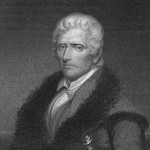
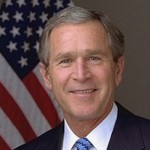 the presidents had to have known at the time they were elected that they had joined an elite group of men, and that would never change from that point on. Good or bad, right or wrong, the decisions they made from the first day of their presidency to the last, would be on record as either a testament or detriment to the man. I think that, in itself, would be a daunting thought, but in reality, they couldn’t think about that much when the decisions that affect a nation are in their hands. Just like their predecessors, they are a part of a long line of presidents, and some of them, are a part of my family.
the presidents had to have known at the time they were elected that they had joined an elite group of men, and that would never change from that point on. Good or bad, right or wrong, the decisions they made from the first day of their presidency to the last, would be on record as either a testament or detriment to the man. I think that, in itself, would be a daunting thought, but in reality, they couldn’t think about that much when the decisions that affect a nation are in their hands. Just like their predecessors, they are a part of a long line of presidents, and some of them, are a part of my family.

